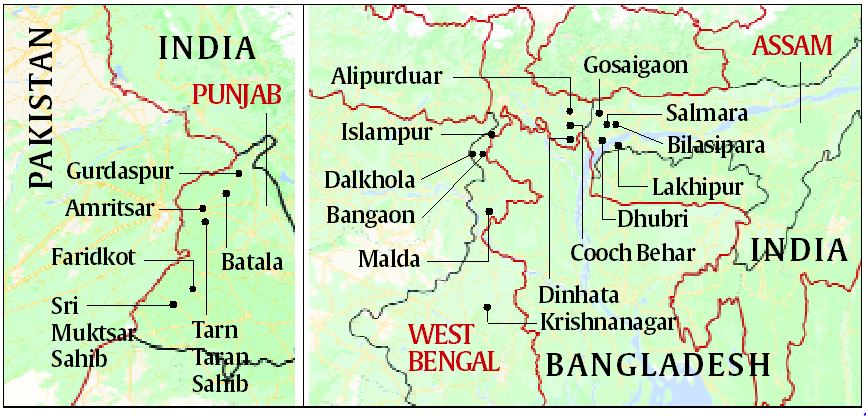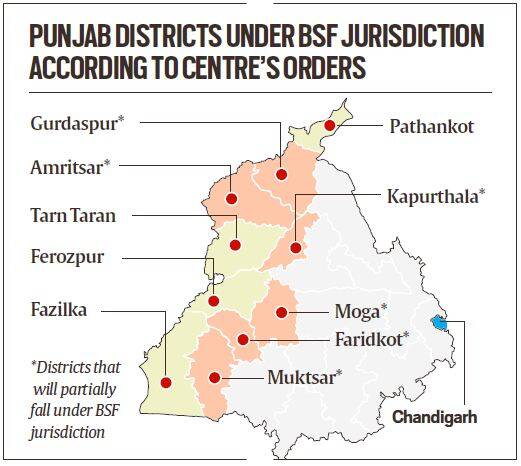Context
-
Recently, the Ministry of Home Affairs (MHA) has extended BSF powers and jurisdiction up to 50 km inside the international borders in Punjab, West Bengal and Assam.
Key Details on BSF powers and jurisdiction
- The BSF’s powers which include arrest, search and seizure — were limited to up to 15 km in these states.

Credit: IE - At the same time, the Ministry has reduced BSF’s area of operation in Gujarat from 80 km from the border, to 50 km.
- It amends the schedule of an earlier notification of July 3, 2014 in terms of the BSF’s jurisdiction, which it outlines as: “
- the whole of the area comprised in the States of Manipur, Mizoram, Tripura, Nagaland and Meghalaya and Union Territories of Jammu and Kashmir and Ladakh and so much of the area comprised within a belt of fifty kilometres in the States of Gujarat, Rajasthan, Punjab, West Bengal and Assam, running along the borders of India.
- The government said it was exercising the powers under the Border Security Force Act of 1968.
- The MHA had outlined BSF’s jurisdiction as
- the whole of the area comprised in the States of Manipur, Mizoram, Tripura, Nagaland and Meghalaya and so much of the area comprised within a belt of eighty kilometres in the State of Gujarat, fifty kilometres in the State of Rajasthan and fifteen kilometres in the States of Punjab, West Bengal and Assam, running along the borders of India.
What kind of powers can the BSF exercise in this jurisdiction?
- Its jurisdiction has been extended only in respect of the powers it enjoys under Criminal Procedure Code (CrPC), Passport (Entry into India) Act, 1920 and the Passport Act, 1967. BSF currently has powers to arrest and search under these laws.

- It also has powers to arrest, search and seize under the NDPS Act, Arms Act, Customs Act and certain other laws. Its jurisdiction under these laws has not been changed, meaning its powers under these will continue to be only up to 15 km inside the border in Punjab, Assam and West Bengal, and will remain as far as 80 km in Gujarat.
Why and when were these powers given to BSF?
- In 1969, the BSF first got powers to arrest and search under the CrPC with respect to certain laws such as the Foreigners Act, The Passport Act, forex laws and Customs Act. BSF sources said even before 2014, they had a jurisdiction of 15 km inside the border in several states.
- “At that time, border areas were sparsely populated and there were hardly any police stations for miles. To prevent trans-border crimes, it was felt necessary that BSF is given powers to arrest. While police stations have now come up near the border, they continue to be short-staffed.
Why has the government extended the jurisdiction?
- The objective of the move is to bring in uniformity and also to increase operational efficiency. Earlier BSF had different jurisdictions in different states.
- BSF often gets information relating to crime scenes that may be out of their jurisdiction.
- The move was also necessitated due to increasing instances of drone-dropping of weapons and drugs.
Will it impact police jurisdiction?
- At a basic level, the states can argue that law and order is a state subject and enhancing BSF’s jurisdiction infringes upon powers of the state government.
- It’s not that the local police can’t act within the jurisdiction of the BSF.
- The state police have better knowledge of the ground. Hence BSF and local Police can act in cooperation.
How will it be implemented?
- Until now, state police and border forces have been working in tandem with minor, occasional differences. Now, with the issue taking political colour, implementation could be tricky if there are difficulties in coordination in future.
- For example, be it the earlier 15 km or the enhanced 50 km, the BSF jurisdiction is not marked on a map. Sources said it is largely based on understanding between police and BSF.
- If a problem arises, maybe we will devise a way to mark our jurisdiction. Currently it is a rough estimate as to which village or town is how many kilometres from the border.
Security Related Current Affairs UPSC 2022 : Click Here
